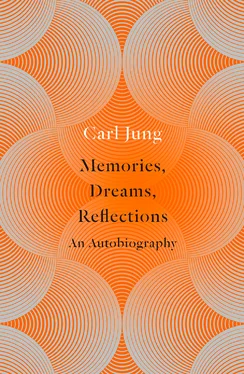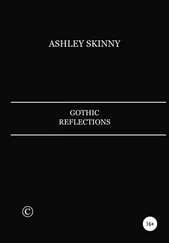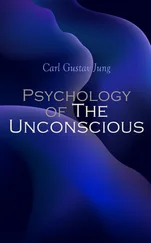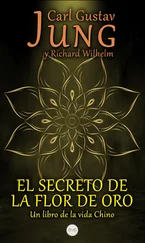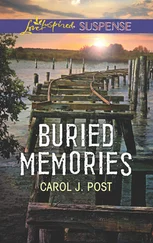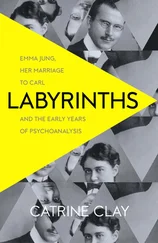So profound was the impression this made upon me that my memories of everything that happened afterwards in “God’s world” were completely blotted out. But No. 1 also came into his own on this trip, and his impressions remained with me for the rest of my life. I still see myself, grown up and independent, wearing a stiff black hat and with an expensive cane, sitting on the terrace of one of the overwhelmingly elegant palatial hotels beside Lake Lucerne, or in the beautiful gardens of Vitznau, having my morning coffee at a small, white-covered table under a striped awning spangled with sunlight, eating croissants with golden butter and various kinds of jam, and considering plans for outings that would fill the whole long summer day. After the coffee I would stroll calmly, without excitement and at a deliberate pace, to a steamship, which would carry me towards the Gotthard and the foot of those giant mountains whose tops were covered with gleaming glaciers.
For many decades this image rose up whenever I was wearied from overwork and sought a point of rest. In real life I have promised myself this splendour again and again, but I have never kept my promise.
This, my first conscious journey, was followed by a second a year or two later. I had been allowed to visit my father, who was on holiday in Sachseln. From him I learned the impressive news that he had become friendly with the Catholic priest there. This seemed to me an act of extraordinary boldness, and secretly I admired my father’s courage. While there, I paid a visit to the hermitage of Flüeli and the relics of Brother Klaus, who by then had been beatified. I wondered how the Catholics knew that he was in a beatific state. Perhaps he was still wandering about and had told people so? I was powerfully impressed by the genius loci , and was able not only to imagine the possibility of a life so entirely dedicated to God but even to understand it. But I did so with an inward shudder and a question to which I knew no answer: How could his wife and children have borne having a saint for a husband and father, when it was precisely my father’s faults and inadequacies that made him particularly lovable to me? “Yes,” I thought, “how could anyone live with a saint?” Obviously he saw that it was impossible, and therefore he had to become a hermit. Still, it was not so very far from his cell to his house. This wasn’t a bad idea, I thought, to have the family in one house, while I would live some distance away, in a hut with a pile of books and a writing table, and an open fire where I would roast chestnuts and cook my soup on a tripod. As a holy hermit I wouldn’t have to go to church any more, but would have my own private chapel instead.
From the hermitage I strolled on up the hill, lost in my thoughts, and was just turning to descend when from the left the slender figure of a young girl appeared. She wore the local costume, had a pretty face, and greeted me with friendly blue eyes. As though it were the most natural thing in the world we descended into the valley together. She was about my own age. Since I knew no other girls except my cousins, I felt rather embarrassed and did not know how to talk to her. So I began hesitantly explaining that I was here for a couple of days on holiday, that I was at the Gymnasium in Basel and later wanted to study at the university. While I was talking, a strange feeling of fatefulness crept over me. “She has appeared just at this moment,” I thought to myself, “and she walks along with me as naturally as if we belonged together.” I glanced sideways at her and saw an expression of mingled shyness and admiration in her face, which embarrassed me and somehow pierced me. Can it be possible, I wondered, that this is fate? Is my meeting her mere chance? A peasant girl — could it possibly be? She is a Catholic, but perhaps her priest is the very one with whom my father has made friends? She has no idea who I am. I certainly couldn’t talk to her about Schopenhauer and the negation of the Will, could I? Yet she doesn’t seem in any way sinister. Perhaps her priest is not one of those Jesuits skulking about in black robes. But I cannot tell her, either, that my father is a Protestant clergyman. That might frighten or offend her. And to talk about philosophy, or about the devil, who is more important than Faust even though Goethe made such a simpleton of him — that is quite out of the question. She still dwells in the distant land of innocence, but I have plunged into reality, into the splendour and cruelty of creation. How can she endure to hear about that? An impenetrable wall stands between us. There is not and cannot be any relationship.
Sad at heart, I retreated into myself and turned the conversation to less dangerous topics. Was she going to Sachseln, wasn’t the weather lovely, and what a view, and so on.
Outwardly this encounter was completely meaningless. But, seen from within, it was so weighty that it not only occupied my thoughts for days but has remained forever in my memory, like a shrine by the wayside. At that time I was still in that childlike state where life consists of single, unrelated experiences. For who could discover the threads of fate which led from Brother Klaus to the pretty girl?
This period of my life was filled with conflicting thoughts. Schopenhauer and Christianity would not square with one another, for one thing; and for another, No. 1 wanted to free himself from the pressure or melancholy of No. 2. It was not No. 2. who was depressed, but No. 1 when he remembered No. 2. It was just at this time that, out of the clash of opposites, the first systematic fantasy of my life was born. It made its appearance piece by piece, and it had its origin, so far as I can remember, in an experience which stirred me profoundly.
One day a north-west wind was lashing the Rhine into foaming waves. My way to school led along the river. Suddenly I saw approaching from the north a ship with a great mainsail running up the Rhine before the storm. Here was something completely new in my experience — a sailing vessel on the Rhine! My imagination took wings. If, instead of this swiftly flowing river, all of Alsace were a lake, we would have sailing boats and great steamers. Then Basel would be a port; it would be almost as good as living by the sea. Then everything would be different, and we would live in another time and another world. There would be no Gymnasium, no long walk to school, and I would be grown up and able to arrange my life as I wished. There would be a hill or rock rising out of the lake, connected by a narrow isthmus to the mainland, cut through by a broad canal with a wooden bridge over it, leading to a gate flanked by towers and opening into a little medieval city built on the surrounding slopes. On the rock stood a well-fortified castle with a tall keep, a watch-tower. This was my house. In it there were no fine halls or any signs of magnificence. The rooms were simple, panelled, and rather small. There was an uncommonly attractive library where you could find everything worth knowing. There was also a collection of weapons, and the bastions were mounted with heavy cannon. Besides that, there was a garrison of fifty men-at-arms in the castle. The little town had several hundred inhabitants and was governed by a mayor and a town council of old men. I myself was justice of the peace, arbitrator, and adviser, who appeared only now and then to hold court. On the landward side the town had a port in which lay my two-masted schooner, armed with several small cannon.
The nerve centre and raison d’etre of this whole arrangement was the secret of the keep, which I alone knew. The thought had come to me like a shock. For, inside the tower, extending from the battlements to the vaulted cellar, was a copper column or heavy wire cable as thick as a man’s arm, which ramified at the top into the finest branches, like the crown of a tree or — better still — like a taproot with all its tiny rootlets turned upside down and reaching into the air. From the air they drew a certain inconceivable something which was conducted down the copper column into the cellar. Here I had an equally inconceivable apparatus, a kind of laboratory in which I made gold out of the mysterious substance which the copper roots drew from the air. This was really an arcanum, of whose nature I neither had nor wished to form any conception. Not did my imagination concern itself with the nature of the transformation process. Tactfully and with a certain nervousness it skirted around what actually went on in this laboratory. There was a kind of inner prohibition: one was not supposed to look into it too closely, nor ask what kind of substance was extracted from the air. As Goethe says of the Mothers, “Even to speak of them dismays the bold.” 7
Читать дальше
